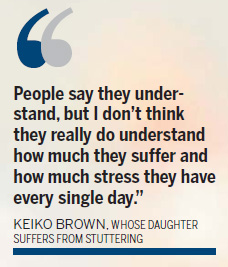The King's Speech spotlights stuttering
|
The Academy Awards' big winner, The King's Speech, draws attention to the emotional struggles of stutterers and the gene linked to the condition. Provided to China Daily |
|
In The King's Speech, British actor Colin Firth plays King George VI, who fought to overcome an embarrassing stutter in the 1930s. Provided to China Daily |

Experts hail the film's exploration of this often-misunderstood condition.
When the envelopes were opened at the Academy Awards ceremony in Hollywood, Keiko Brown was rooting for The King's Speech to take home best film, best actor - best everything.
Brown's 17-year-old daughter Melanie stutters, as did King George VI, who is played in the movie by British actor Colin Firth.
To the mother of a child who stutters, The King's Speech, which was crowned the big winner with four Oscars, including best film, and best actor for Firth, has gone a long way toward teaching people with fluid speech about the high-stress world of stutterers.
"Before, nobody really understands," says Brown, as she sits in the waiting room of therapist Vivian Sisskin, the University of Maryland speech disorder expert who has just led Melanie and three other teenage girls with stutters through a one-hour therapy session.
"People say they understand, but I don't think they really do understand how much they suffer and how much stress they have every single day," Brown says, her gaze fixed on Melanie, sitting at her side.
The King's Speech is based on the true story of how a speech therapist helped George VI control a severe, lifelong stutter to allow the monarch to address the British people as they prepared to enter World War II.
The National Stuttering Association hailed it as an "accurate depiction of people who stutter through the compelling story of a real-life hero".
Debbie Grinstead, mother of 16-year-old Claire, calls The King's Speech a "burden-lifting experience for those who stutter", while her daughter, whose speech disorder includes tongue clicks, says Firth deserved an Oscar just for having the courage to step into the skin of a stutterer.
"Stuttering is so stressful. If you induce that kind of stress on yourself, I think that deserves everything," she says.
Stutterers are often thought to be stupid and nervous, but the four girls in therapy with Sisskin are anything but.
Jacqueline Speiser, 16, is an "A" student at the best public high school in the United States, Thomas Jefferson High School for Science and Technology, in Virginia.
She started therapy with Sisskin around four months ago after she realized, "I was messing up my advanced Spanish course, because I would stutter during presentations".
Melanie wants to be a doctor when she grows up. Claire wants to be a genetics counselor, and Dina Trembinsky, 16, has her eye on a job in communications and advertising.
Some fluid speakers assume - wrongly - that stutters are caused by abusive parents or are a psychological disorder.
But a study published in 2010 in the New England Journal of Medicine found that they could be linked to defects in three genes.
"When you meet someone who stutters, it's just like meeting someone with another condition that they were born with or have a predisposition to develop, like asthma or diabetes," Sisskin says.
Jane Fraser, president of the Stuttering Foundation of America, says The King's Speech has created a "tsunami of awareness" of the fear and stress that stuttering brings to sufferers and their families.
"My father was a very severe stutterer, and only now are my cousins and aunts and uncles calling me and saying, 'Now we understand what your father went through; now we understand why you're doing the job you're doing', " Fraser says.
"Even close family members never understood the horror that it was for him - and for me, waiting for him to get his words out. As a child, I would sit there and get so tense waiting for those words to come out and agonize over what I could do to help get them out."
Stuttering tends to come on between the ages of 2 and 5. But in nearly 80 percent of cases, the child spontaneously heals from his or her stutter.
Sitting on the off-white couch in Sisskin's waiting room, Irina Tremblinsky wonders if she could have prevented her daughter Dina's stammer, "by dealing with it right away when we noticed that she stuttered, when she was 2 years old".
"But the pediatrician told us don't worry about it; she's too small. So we waited, and we probably waited too long," she says.
Keiko Brown wishes for a miracle that would allow her to trade places with Melanie.
"If they can switch us and I can stutter from now on, it doesn't bother me," she says.
"But her life is from now on. And she has to go through so much."
Agence France-Presse
(China Daily 03/02/2011 page19)
























